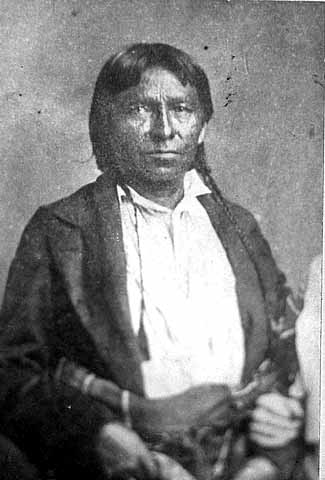 "We think our Great Father may have forgotten his Red children & our hearts are very heavy — the Agents he send to us seem to forget their father’s words before they reach here for we often think they disobey what he has said. . . . You have said you are sorry to see my young men engaged still in their foolish dances--it is because their hearts are sick. They don’t know that whether these lands are to be their home or not."
"We think our Great Father may have forgotten his Red children & our hearts are very heavy — the Agents he send to us seem to forget their father’s words before they reach here for we often think they disobey what he has said. . . . You have said you are sorry to see my young men engaged still in their foolish dances--it is because their hearts are sick. They don’t know that whether these lands are to be their home or not."
Wabaṡa to Bishop Whipple, 1862
Chief Wabaṡa (also known as Wabasha, Wapasha, or Tahtapesaah), a member of the Mdewakanton band of Dakota, lived on a farm on the Lower Reservation by the Agency. During the U.S.-Dakota War, there were divisions between groups of Dakota people who were for or against the fighting. Wabaṡa joined a group of Dakota called the Peace Party whose aim was to bring people to safety.
After the war, Wabaṡa was exiled to Crow Creek in South Dakota, and later to Santee, Nebraska.
Anderson, Gary Clayton and Alan R. Woolworth, Through Dakota Eyes: Narrative Accounts of the Minnesota Indian War of 1862. St. Paul: Minnesota Historical Society Press, 1988.
Henry B. Whipple Diary, Vol. 4: 1862. Episcopal Church Diocese of Minnesota Papers. Minnesota Historical Society, Manuscripts Collection
Primary
Anderson, Gary Clayton and Alan R. Woolworth, Through Dakota Eyes: Narrative Accounts of the Minnesota Indian War of 1862. St. Paul, MN: Minnesota Historical Society Press, 1988.
Henry B. Whipple Diary, Vol. 4: 1862. Episcopal Church Diocese of Minnesota Papers. Minnesota Historical Society. Manuscripts Collection




